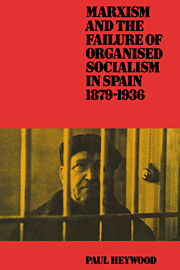Book contents
- Frontmatter
- Contents
- Preface
- Abbreviations used in text
- 1 Decaffeinated Marxists: the PSOE, 1879–1914
- 2 Reform, revolution and the roots of rupture: the PSOE, 1914–1919
- 3 Socialist schism and the development of organised Communism, 1919–1923
- 4 Dealing with a Dictator: organised Socialism, 1923–1931
- 5 Marxist mistakes: misinterpreting the Second Republic, 1931–1934
- 6 Marxism marginalised: the PSOE and the creation of the Popular Front, 1934–1936
- Conclusion
- Notes
- Bibliography
- Index
1 - Decaffeinated Marxists: the PSOE, 1879–1914
Published online by Cambridge University Press: 08 September 2009
- Frontmatter
- Contents
- Preface
- Abbreviations used in text
- 1 Decaffeinated Marxists: the PSOE, 1879–1914
- 2 Reform, revolution and the roots of rupture: the PSOE, 1914–1919
- 3 Socialist schism and the development of organised Communism, 1919–1923
- 4 Dealing with a Dictator: organised Socialism, 1923–1931
- 5 Marxist mistakes: misinterpreting the Second Republic, 1931–1934
- 6 Marxism marginalised: the PSOE and the creation of the Popular Front, 1934–1936
- Conclusion
- Notes
- Bibliography
- Index
Summary
Introduction
Studies of the Spanish labour movement prior to the Second Republic, established in 1931, have tended to concentrate on the Anarchists. This is unremarkable, given the enormous strength and influence of Spanish Anarchism until its repression during the three-year civil war which destroyed the Republic. The war was marked by an unstated, unholy – and wholly unlikely – community of purpose between Francoists and Communists. Their mutual hatred barely masked a common desire: the stamping out of Anarchist revolutionary initiatives unleashed by the collapse of the Republic. The Second Republic itself, though, was intimately associated with the Spanish Socialists: its creation was above all their triumph, its collapse their tragedy (some argue, their fault). As the largest political party of the Left, the Partido Socialista Obrero Español (PSOE) played a pivotal role, both in government and in opposition, during the Republic's all too brief five-year existence. For this reason, historians of Spanish Socialism have properly focussed their attention mainly on the PSOE's turbulent experiences between 1931 and 1936. Indeed, in recent years a lively historiographical debate has developed over the role of the PSOE's internal divisions in the polarisation of politics during the Second Republic. However, the strength of Spanish Anarchism before 1931 and the centrality of the PSOE in the Republic have combined to obscure the fact that organised Socialism goes back a long way in Spain. In fact, the PSOE was originally founded in 1879, making it one of the oldest Socialist parties in Europe.
- Type
- Chapter
- Information
- Publisher: Cambridge University PressPrint publication year: 1990



